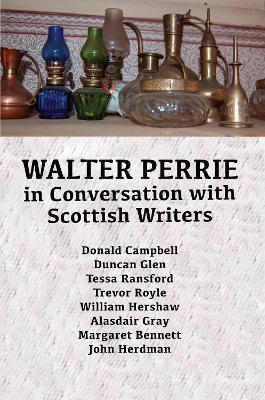ABOUT THE BOOK: EIGHT CONVERSATIONS WITH SCOTTISH WRITERS.
The interviews in this collection were first published as individual ‘Fras’ pamphlets and were recorded over a period of fifteen years between 2006 and 2020. The oldest of the interviewees, DUNCAN GLEN, was born in 1933 and the youngest, WILLIAM HERSHAW, in 1957: two, TREVOR ROYLE and TESSA RANSFORD, were born in India, reflecting the deep entanglement of Scotland and Empire. With the exception of the youngest, what they have in common is that they comprise a generation growing up in the shadow of war through the austerities of the forties and fifties, but unlike the generation immediately preceding theirs, that of HAMISH HENDERSON, ALEXANDER SCOTT, SORLEY MACLEAN, none of them saw active service. What they did see was the end of Empire and the growing prosperity and gradual liberalisation of social attitudes through the sixties and seventies.
JOHN HERDMAN and I founded ‘Fras’ Magazine and Publications in 2004. We had first met in Edinburgh in 1970 where we were both leading active literary lives: by 2004 we were both living in rural Perthshire; John in Blair Atholl and I in Dunning and both felt that the achievements of some of our own generation were being lost in the political and cultural turmoil that had happened since. In retrospect, I believe the later sixties and seventies marked a decisive turning point in our history. The shift begins with the first Wilson government in 1964, the first Labour administration since Attlee’s in 1945, and ends with the election of Thatcher’s Tories in 1979. The two great wars of the twentieth century had momentarily consolidated and heightened a sense of Britishness in which genuine Scottish cultural elements became all-but invisible. It was perhaps emotionally difficult for generations who had lived through Britain’s wars to oppose its political clichés and unfairness, but the combination of prosperity and a resurgence of Scottish identity, helped produce a brief period of heightened cultural activity.
Scotland in the 1970s seemed small enough for its cultural activists to know each other as people we met at readings, drinking sessions or literary receptions: people we may have liked or, in keeping with Scottish tradition, detested, but whom we knew as individuals, not just as literary figures. So I had come to know not only JOHN HERDMAN but DONALDD CAMPBELL, DUNCAN GLEN, TREVOR ROYLE, TESSA RANSFORD
and many another no longer extant. DUNCAN was a central figure in publishing Scottish literature, especially in the Scots language, and in bringing to national and international attention the then neglected figure of HUGH MACDIARMID, and DONALD CAMPBELL was to go on to establish himself as a major figure in Scottish theatre, a genre which had until then, had only the shallowest of roots in Scottish culture. These relationships, at once both personal and literary, were in some degree the norm rather than the exception, so that, I would suggest, there existed a sense of historic community across Scottish literary and cultural life where an older generation of writers, such as EDWIN MORGAN, IAIN CRICHTON SMITH, MAURICE LINDSAY, WILLIAM MONTGOMERIE, J.K. ANNAND, GEORGE BRUC and HAMISH HENDERSON, all interacted with their younger peers. That continuity seemed to dissipate through the 1980s and in 2021 no longer exists.
So it is that these interviews, apart from their intrinsic interest, also mark a moment in our history, TREVOR ROYLE, of course, went on from his energetic literary direction of the Scottish Arts Council to become one of Britain’s leading historians of all matters military. ALASDAIR GRAY achieved international reputation with his novel ‘Lanark’. TESSA RANSFORD was the most persistent and dedicated founder of the Scottish Poetry Library; MARGARET BENNETT became internationally recognised as Scotland’s foremost folklorist and performer of traditional songs and stories. JOHN HERDMAN has established himself as novelist, short-story writer and scholar, whose tales are translated into French and Italian. WILLIAM HERSHAW is a leading Scots-language poet and musician, and it would be invidious of me not to mention the youngest of those involved in creating these interviews, RICHIE MCCAFFERY, whose knowledge of Scottish literature is both wide and deep and who is in his own right already a fine poet. WALTER PERRIE, Dunning, Aug 2021.
- ISBN13 9781913162177
- Publish Date 1 August 2021
- Publish Status Active
- Publish Country GB
- Imprint Grace Note Publications
- Format Paperback
- Pages 322
- Language English
